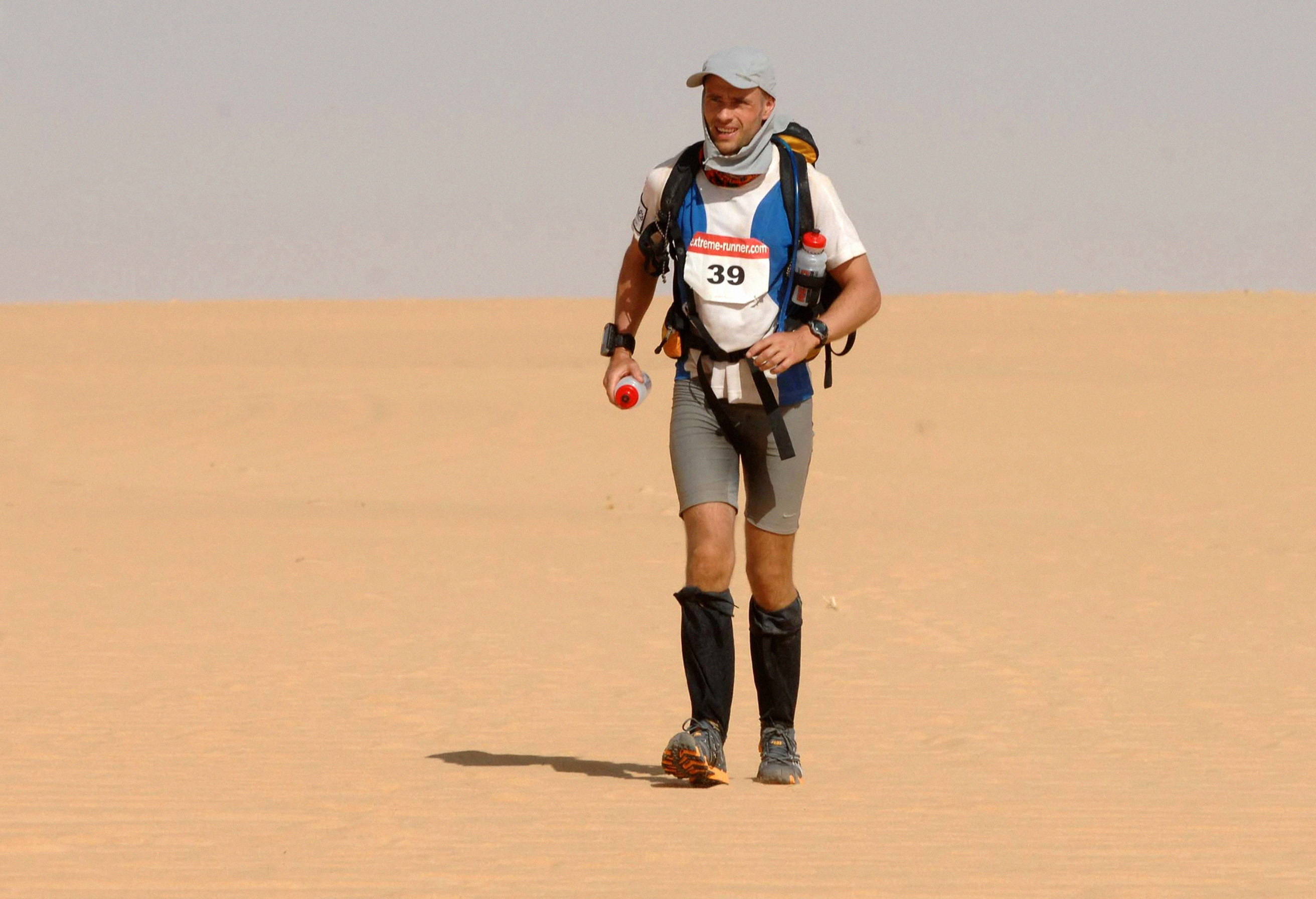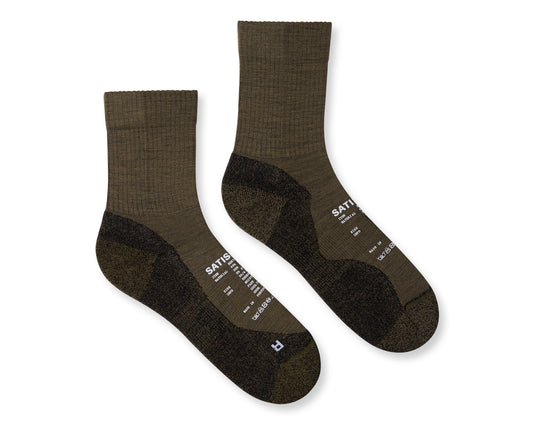
Ultra-marathons are amazing, but they're pretty weird when you think about it. What's even weirder, though, is extreme ultras. An extreme ultra is where you take an ordinary ultra and make it even worse—or better, depending on how much you enjoy enormous, mind-scrambling difficulty.
British ultrarunner Mark Cockbain is no stranger to difficulty. After an ultra career that would leave most people dead in a ditch, he began designing races that cater to the ultra-runner who likes a little more spice. For example, Mark's company, Cockbain Events, offers a race that covers the length of Wales, all 250 mountainous miles of it (402km), and you have to do it non-stop in 88 hours or less. Then there's another race that follows the Greenwich Meridian line in England. 330 miles (531km) with zero support, six days to complete, and you have to sleep rough. No campervans, no Airbnb's. These are actually two of the less frightening races. Wait till read about the other ones. It gets weird. The weirdest thing, though, is people enter Mark's challenges willingly. In fact, they pay for the privilege. And if you don't think that's weird—you're weird. But good for you. You've got more mettle than most of us. We had a chat with Mark.

'...entering the Marathon des Sables, I didn't have much of an idea of what I was doing at the time... the backpack was quite heavy—ten to twelve kilograms—and I was standing there with sunglasses on, and I'm thinking, "It's really hot, this is impossible, what am I doing?"'
When did you start running and why?
Well, it was back when I was in my late twenties. It started with marathons. I wanted to run a marathon, so I did the Paris Marathon and then went on to do more and more of them. Eventually, I got in under three hours, and I decided I wanted to go longer next, so I started looking at ultras.
Was this in the '90s?
Yeah, the first marathon was in the late '90s. Once I'd cracked three hours, I knew I wasn't going to get any faster, and then I saw an advert for the Marathon des Sables in a magazine, and I thought, 'I can't believe people do that kind of thing—'
You mean run 250km across the Sahara Desert?
Yeah, so then I started training for that.
MDS was your first ultra?
Well, the training for that was my first ultras. I think there were a couple of 50 milers leading up to MDS, but I really jumped in at the deep end with that. There wasn't much of an internet back then, so you received information about ultrarunning through word of mouth. There was a very small ultra community in the UK and less than ten ultramarathons. So, entering the Marathon des Sables, I didn't have much of an idea of what I was doing at the time. Obviously, you've got to take all your food and equipment for the whole week and carry it with you, so that was another angle to it. You had to carry a backpack, and I remember standing at the starting line and wondering what I was doing. Because the backpack was quite heavy—ten to twelve kilograms—and I was standing there with sunglasses on, and I'm thinking, 'It's really hot, this is impossible, what am I doing?'
I'll bet.
But after that—because you mix with a lot of different people at that event—I found out about other races. So, it was a good starting point, really, and you get a bit of confidence once you finish a race like that, and you meet people who tell you about other races. But I remember there was an article about Badwater in one of the Sunday papers—people running through Death Valley—and I was amazed by it. I couldn't believe people could run in that kind of heat. So, I heard about that one, and then I watched something on telly about someone running six back-to-back marathons in Greece, non-stop, and this was the Spartathalon. I remember watching that and thinking, 'Oh, my god. How could anyone do that kind of thing?' And it stuck in my head, and, as I say, at the time, there was no real internet, but I researched them and thought, 'These are races that I want to do when I've got a bit more experience.' So, I always had those kinds of things in the back of my mind, and then I just started entering more and more ultras and training toward those kind of bigger races.

'There was your classics: London to Brighton, the Grand Union Canal Race, Two Bridges in Scotland, Dartmoor Discovery, and maybe a handful of others, but if you wanted to build up your ultra CV, you'd probably have to repeat a lot of those races, so I was looking at races abroad.'
It must seem crazy to you now, a couple of decades on, seeing how the ultra scene has changed.
Oh, it's unbelievable. You can literally do two different ultras every weekend in the UK now. But like I say, when I started there were less than ten. There was your classics: London to Brighton, the Grand Union Canal Race, Two Bridges in Scotland, Dartmoor Discovery, and maybe a handful of others, but if you wanted to build up your ultra CV, you'd probably have to repeat a lot of those races, so I was looking at races abroad. But it's gotten so much more popular, and now there's so much more information out there and so many races. I don't think you do them all in a lifetime.
How did you get started designing races?
Well, I kinda just ran myself into the ground. I went on to do so many ultras—the Badwaters, the Spartathalons, across the Arctic, across deserts—and I had an underlying knee issue. When I was younger, I had a bit of cartilage removed from my knee, and then after MDS, I did a race in the Jordan desert, and I started having a problem with the same knee. I had more cartilage removed, and eventually I was training in 2011 or 2012 for this race across America... I think it went for 70 days or something like that... So, I was training for that, and my right knee just catastrophically went.
Ah, fuck.
Yeah. And I went and got a diagnosis, and I've basically got no cartilage left in it. I tried so many different things: stem cell injections in the USA, I saw numerous consultants, you know, but there's nothing that can be done for the moment. I'm still kind of holding out. Anyway, it's basically an addiction. You finish a race, and then you want to do more and more, and you can't stop, so the knee put an end to it. But I thought, 'What am I gonna do now?'
That sucks.
It was kind of a low time. But I decided not to let it get me down because I still wanted to be in with that crowd; I've got a lot of friends that do the races, so I started looking at designing races myself. I began looking for long-distance paths in the UK that hadn't been used before, but then I thought I needed to throw in some elements. Because all the races that I'd done were extreme, they had an x-factor, whether it be altitude or extreme weather conditions, and with all those races that I finished, I was just hanging on at the end, and each finish meant so much, you know?
Right.
So, I wanted to make races that were extremely difficult to finish, so that for those people that did finish, they'd always remember spilling their guts to get there. So, the first thing I looked at was Viking Way, which is an old path here in the UK: 147 miles (236 km) long. But then, there's another race in the UK, the Grand Union Canal, which is a similar distance, so I thought I'd cut down the finish time so that you have to run it at a decent pace the whole way, and I'll have it in winter so the conditions are horrendous, and there were also hills on this route; it wasn't flat, and it was muddy and everything—
That sounds excellent.
Yeah, so I threw different elements into the race, and there was minimal support. We had checkpoints every 25 miles...
How'd it go?
That was a success, and I managed to keep in touch with some of the people I used to run with. So, I thought, 'What else can I do?' And I think the next one I did was called The Hill.
I just read about The Hill. It sounds awful. For the readers, what is it?
It's a hill in the Peak District in December. You're basically climbing up and down a hill, a three-mile round trip, 55 times to get up 160 miles (257 km).
Jesus.
Yeah, it was horrendous. There's snow on the ground and the wind is blowing, and you're up above sea level, and you've got 48 hours to cover 160 miles. We only got one finisher the first year.
Tell me about The Chained Ultra. What was that?
Yeah, I thought it'd be a good idea to chain two people together—
[laughter]
—and I looked for a circular route in the middle of England and found Rutland Round. For the first edition of that, I wanted to make it really, really difficult. And I thought that chaining two people together would be pretty tough, but then I made it 130 miles (209 km), and you have to do it in 32 hours, with minimal support, and the chained-together runners don't actually know each other.
What?!
So, people turned up, and then we drew names out of a hat to see who would be chained to who.
You're kidding.
It was so funny.

'I thought that chaining two people together would be pretty tough, but then I made it 130 miles (209 km), and you have to do it in 32 hours, with minimal support, and the chained-together runners don't actually know each other.'
Wow. That's awful.
[laughter]
We were literally chaining strangers together. Obviously, there were prerequisites to enter—they had to have done a hundred miler before—but nobody knew if they were going to get along with each other.
Was it mixed male and female?
Yeah, there was no discrimination. We had a few interesting couples. Some were males and females chained together, and then there were people who just didn't like each other at all that were chained together.
[laughter]
You saw it at the checkpoints: some people wanted to rest while others wanted to keep going, and they were arguing with each other...
That sounds so, so awful. Any finishers?
Not on that first edition, no. We got some people who came really close in the last fifteen miles, but it was a case of one person not being able to go on and the other having to stop for them.
That'd be frustrating for the person who wants to continue.
Yeah. I still do that event, but it's within another event. I've got a friend who has a race where people start in the middle of England, and they have to get as far away as possible.
Oh, the Escape from Meriden?
That's it. So, I've got an event within that, but I don't do it with strangers; they come with their friends.
That's more reasonable.
Well, I tried putting [The Chained Ultra] on again the year after, and I didn't get any entrants.
None?
No. I think the stranger concept put people off. So, when my friend started doing Escape from Meriden, I asked if I could put the chained one in as a separate category.
Has anyone finished it now?
We've had a couple of couples who have managed to make it to 130 miles, so I've given out some medals. But it's not really in the original format, although it's still very difficult.
I guess the most well-known race that you've done—or at least the one that I've seen written about the most—is The Tunnel, which is a 200-mile (322 km) race in a tunnel in Sommerset, is that right?
Yeah, that one's really taken off. I was looking to do something with sensory deprivation, something in the dark, down a mine, or something like that. So, I looked around and found these tunnels near Bath in Somerset, and it just so happened that the longest of these tunnels is exactly a mile long, and I thought, 'Oh, that's brilliant! If we had timing mats at either end, I could make people run 200 miles in a tunnel.' And I decided to make the cut-off time quite tight, so 55 hours, which is tight for 200, but then again, it is flat...

'...because it's an old railway tunnel, it's actually carved into the rock, and even if you're not one of the runners, you can still make out faces and figures in the rock walls, so they must've been seeing crazy things by the second night. Some guy said he saw a giant hedgehog.'
Oh, that makes it easier.
But it's going to be difficult because of the sensory deprivation. I like to start races like The Hill or The Tunnel in the evening so that they have to go through two nights without sleep; that way, they do the first night, and then when they're into the second night, the hallucinations really start kicking in—
Fucking hell.
[laughter]
What kind of things were people hallucinating in the tunnel?
Well, because it's an old railway tunnel, it's actually carved into the rock, and even if you're not one of the runners, you can still make out faces and figures in the rock walls, so they must've been seeing crazy things by the second night. Some guy said he saw a giant hedgehog.
[laughter]
Yeah, people really start to lose their marbles on the second night. So, there's lots of little things you can do to make races more difficult. And I always make sure that there's no support: you can't bring any pacers, I don't allow any headphones—you've got to look within yourself for inspiration—no sticks; I never allow walking sticks or anything like that—
You're an evil genius.
Well, not many people finish, but the ones that do finish, they'll never forget it, you know? And that's the aim. It harkens back to the ultras that I did. I found them really difficult to achieve. And what I don't want is a load of people turning up and a load of people finishing. What's the point of that?
Right, right. It's like Montessori or something: everyone gets a prize for just showing up.
Yeah, I want them to really earn the finisher's medal.
Do you have any new races coming up?
I've actually got a shorter race this year; it's only 50K, but they've got to carry a 4-kilogram canon ball. And it's quite a hilly route. I don't know if you've ever tried running with a 4-kilogram canon ball—
I haven't.
Well, it doesn't seem too bad to begin with...
What do you do when you're not designing these torturous races, or is this your full-time job?
No, it's just a hobby. I'm an electronics engineer. This is just something I do on the weekends, really.
What kind of people enter your races?
Well, I only have thirty to forty entrants in any race, so it's aimed at the ultra-runner who wants to give themselves a good beating... They've done quite a lot of other stuff, but now they're looking for something else.
And they know what they're in for.

In This Issue

Notes from the Underground
Whacking Weeds With Delicate Steve
READ
Phone it in
Max Jolliffe
READ
Eat it
How to Make Swifticle Picksicles®
READ
Welcome to Earth
What is Barefoot Running?
READ
Smoke Signals
Please, Please, Mr. Postman
READ
Get Possessed
The Weird World of Extreme Ultras with Mark Cockbain
READ
Highway to Health
Over-Supination
READ
The Bullshit Report
'I Don't Have a Runner's Body'
READ
The Knowledge
Top 7 Weirdest Moments in Running
READ
Your Running Stars
The Weird Month Ahead
READ
High Rotation






